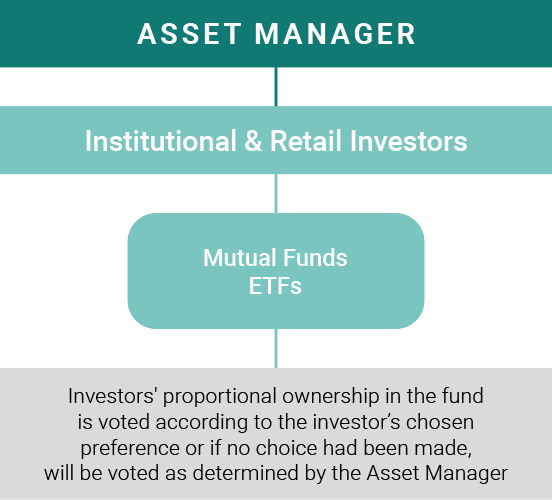
Subscribe to stay informed, inspired and involved.
Blackrock recently issued a release noting they were taking their pass-through voting to the next level, deciding to roll out the pass-through voting option, which they call “Voting Choice,” to millions of their retail investors. Here we delve into the concept of pass-through voting and provide an overview of the current status of pass-through voting within three major fund families.
Pass-through voting is when asset managers allow their clients to vote shares for the public companies that they own on the client’s behalf.

Pass-Through Voting Review
In 2022, Vanguard started a pilot program for select holders in certain Vanguard funds to direct how Vanguard votes the holders proportional share ownership within the fund. The funds included: the Vanguard S&P 500 Growth Index Fund, the Vanguard Russell 1000 Index Fund, and the Vanguard ESG U.S. Stock ETF. Vanguard gave investors in this pilot program four voting options to choose from: Vote as the Board recommends, rely on guidance from a proxy advisory firm, allow Vanguard to continue to vote on their behalf (the default if no choice was made), and investors can ask the fund to simply not vote their shares.
Vanguard said they would use the pilot program to help them determine the most effective and efficient way to allow investors to express their views on the proxy voting process.
Expanding on the initial pilot program, in early 2024, Vanguard will expand its offering to include five additional funds:
- Vanguard S&P 500 Growth Index Fund
- Vanguard Russell 1000 Index Fund
- Vanguard ESG U.S. Stock ETF
- Vanguard Mega Cap Index Fund
- Vanguard Dividend Appreciation Index Fund
Vanguard noted that these funds represent over $100 Billion in assets under management and will include millions of retail investors in these funds.
They noted that in early 2024, holders within these funds will receive information regarding selecting a voting policy via a secure website Vanguard has set up. Investors will be able to choose from four different voting policies to direct Vanguard on how to vote their proportionate ownership in the fund.
In 2021, Blackrock began to allow certain institutional investors to vote shares that they owned of companies within certain Blackrock funds. In 2022, Blackrock increased the percentage of its assets under management (AUM) that could participate in Voting Choice. At this time, Blackrock noted in one of its releases that out of the $3.8 Trillion in Blackrock indexed equity funds, $1.8 trillion were eligible to take advantage of this ability to direct the vote, while $452 billion actually took advantage of it last year.
On February 13, 2024, Blackrock announced that it was expanding its pass-through voting offering, on a pilot program basis, to the three million individual holders in their iShare Core S&P 500 ETF. While these shareholders will not be able to vote on specific company ballot items, Blackrock is giving them six different policies (in addition to Blackrock’s Stewardship Policy) to choose how they would like Blackrock to vote:
Three policies come from Institutional Shareholder Services (ISS):
- Socially Responsible Investment Policy (SRI)
- Catholic Faith-Based Policy
- Global Board-Aligned Policy
Three other options will come from Glass Lewis:
- Glass Lewis Benchmark Policy
- Climate Policy
- Corporate Governance Focused Policy
In its release on February 13, Blackrock noted that as of the end of 2023, $2.6 trillion are eligible for Voting Choice, and almost $600 Billion enrolled in Voting Choice.
In 2022, State Street Global Advisors (SSGA) announced it would be offering more investors the ability to direct how SSGA votes shares for companies that it owns.
SSGA indicated that by the start of the 2023 proxy season with this new initiative over 40% of the equity index managed assets will have the ability to make choices regarding how shares held in the SSGA funds are voted.
Currently, State Street notes that 81% of their total assets under management (or about $1.9 trillion) are eligible for their proxy voting choice initiative.
SSGA offers investors multiple options to direct their votes, all provided by ISS:
- ISS Benchmark Policy
- ISS Sustainability Policy
- ISS Socially Responsible Investment Policy
- ISS Catholic Faith-Based Policy
- ISS Public Fund Policy
- ISS Taft-Hartley Policy
- ISS Board Aligned Policy (US only)
- Vote with the Company Board Recommendation
In all cases, if the investor doesn’t make a choice regarding a voting policy, the asset manager will continue to vote on the funds behalf as it has been doing.
Of note, the costs associated with pass-through voting are borne by the asset manager allowing for pass-through voting and not the issuer.
Conclusion
It remains to be seen what impact pass-through voting will have on the 2024 proxy season. To date, we have not seen a significant change in the voting patterns of the asset managers discussed above.
This year, more investors than ever will have the option to direct their asset manager’s vote and that ability is becoming more publicized which may mean that we will start to see some of the positions held by these large institutions start to diverge in their voting patterns as more of their clients take advantage of the ability to direct their portion of the votes.
We will continue to monitor this issue and keep our clients apprised of any significant changes in voting patterns that we see as the 2024 proxy season gets into full swing.
Summary
